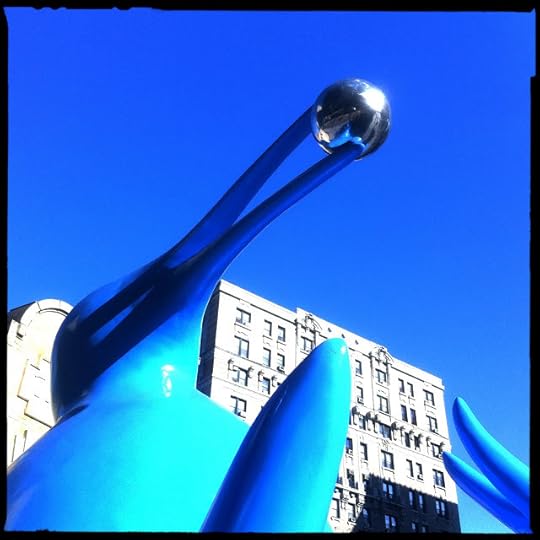The Re-invention of Hugo Cabret
 Geof Huth, "The Blue Bird of the 72nd Street Subway Station" (25 November 2011)
Geof Huth, "The Blue Bird of the 72nd Street Subway Station" (25 November 2011)One day shy of four years and four months ago, when I was still an innocent child, I wrote a review of "The Invention of Hugo Cabret" in this very space. My review was positive, though I certainly characterized the writing in this illustrated book as just a little better than dull. But it is not only words that make a book work, sometimes it is also images, or how the images work with the words.
This afternoon, I saw the movie Hugo, based on the same book but retitled by Hollywood, which believes the more uninteresting a title is the better one will be able to promote the film. Directed by Martin Scorsese, this film hews closely to the story in the book (though Hugo peers from the 4 in a clock instead of the 5), and (more importantly) it maintains the books "second act" focus on Méliès and silent film in general.
Since I the time when I'd read the novels, which is now a lifetime ago, I have seen scores of early silent films, at least doubling the number I had seen up until that time, so every snippet of a film that flashed before my eyes was a bit of a film I actually recognized. I had that connection to the predecessors of this film. And so does Scorsese. At his core, Scorsese is not a filmmaker; he is a film fanatic, an historian. And this film of his is both an authentic and moving replication of the original verbo-visual novel it's based on and an homage to a style and era of filmmaking that we have generally abandoned. The act of making this film is an act of restoring our memory of the mute films of the past, and this resonates with the story of the film itself. The film as a project, thus, recreates the book as a project and the book as a story.
Which is perfectly right, since no film is actually about itself (unlike, say, poems, which are usually about themselves); they are always about something else; they are always replicants standing in for something else.
So I watched the film in 3D, at a theater near the 72nd Street subway station in Manhattan, and I was amazed at its artistry, its sense of magic, and it all reminded me of how the now clumsy special effects of Méliès were actually acts of supreme genius. He thought beyond the film stock, and so he figured out how to make appear on it what was never quite there.
This film reverberates with the past: the past of Paris, the past of cinema, the past of the characters occupying that pseudo-3D space before my eyes, and the past represented by the book fewer people will read than will see the movie (even though that thick book is a quick and beneficial night's read). But it is also a good story well told, with characters that are much more real than those of the book. Here, rather than in the original book, the people become real flesh and blood, beings we can believe in and care about, even the station master. So I teared up, because I am a sap and my heart runs slow though steady, near the end of the story when Hugo Cabret begs the stationmaster to let him go, because the stationmaster should understand, and the stationmaster knows Hugo is right, and knows that his only chance is also Hugo's: that he has to let him go.
And so the trick of caring for a celluloid person works on me, because I want to replace the clockwork of our lives, no matter how efficient and effective, with the beating heart of a body, because it is better to care at all than to wait until it is the perfect time to care. So I would tell you, if I could tell you directly, to see this film, because it is beautiful visually, because the actor's make themselves fragile and real, because Scorsese makes a Hitchcockian camio, because the special effects are perfect because they are unobtrusive and propel the story, because the clockwork automaton who draws us and the characters themselves into the story has a real beating heart that we can never see.
And I say this even though I can never understand why Hollywood usually thinks that all foreign languages when represented in English on the screen need to be presented with British accents, instead of American or Canadian ones or the accent of the languages people are actually supposed to be speaking.
There is, I suppose, nothing real about the movies, and nothing real about the hearts we discover we have while sitting in the dark to watch them.
ecr. l'inf.
Published on November 25, 2011 20:06
No comments have been added yet.



